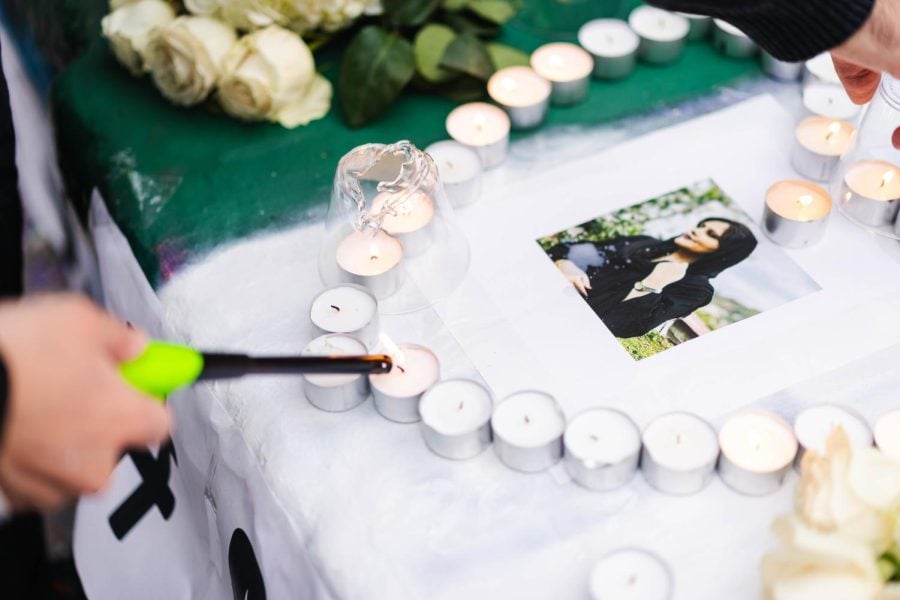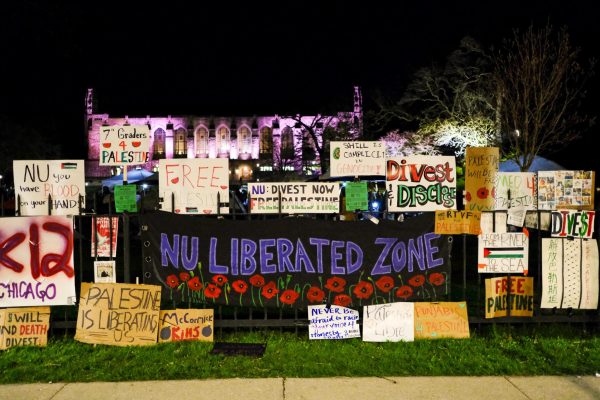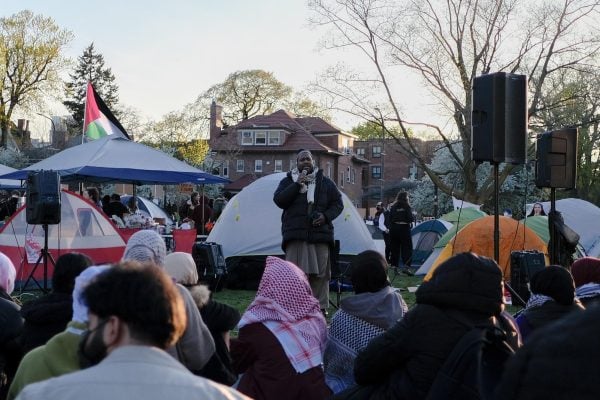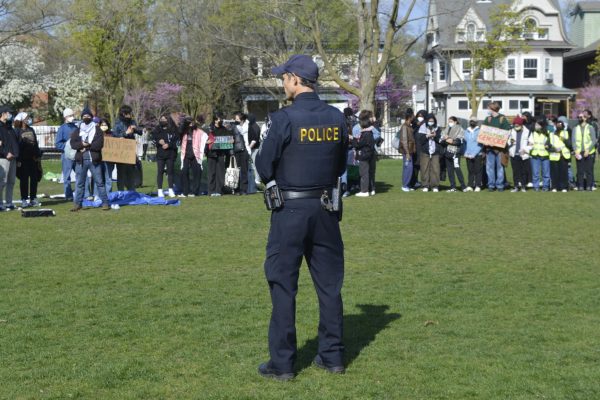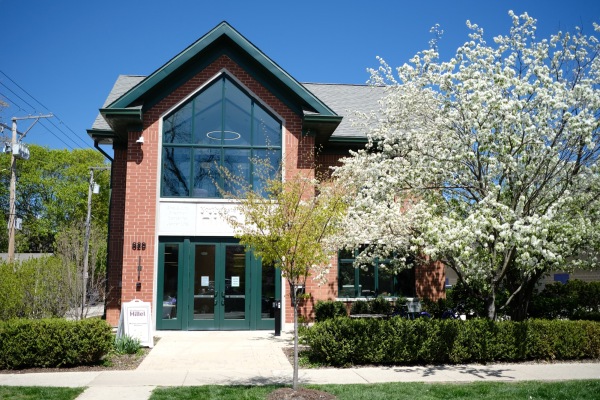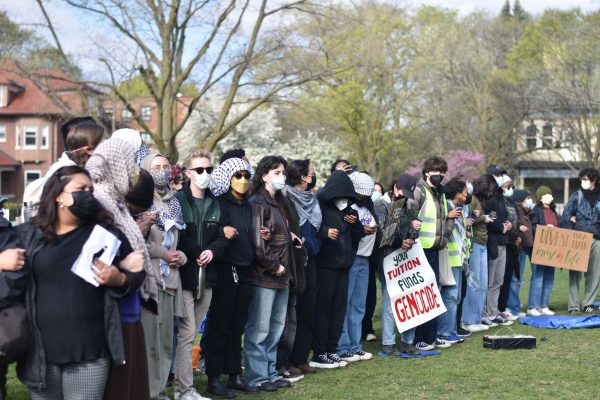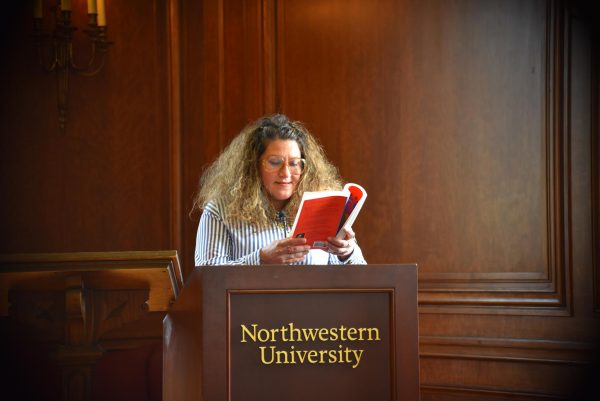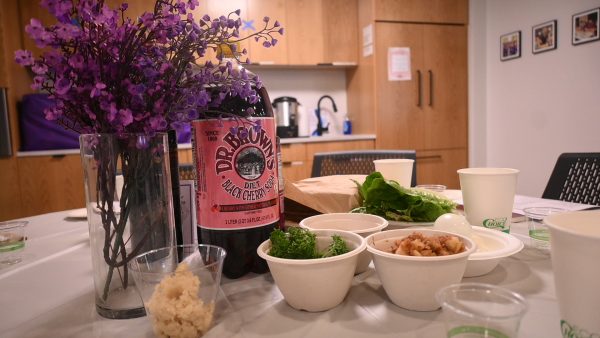Community members mourn deceased Kurdish woman, voice support for nationwide protests in Iran
A photo of Mahsa Amini surrounded by candles. The Iranian Student Association organized a vigil to honor her life on Friday.
Content warning: this story contains mentions of death.
More than 50 community members gathered at The Rock on Friday for a vigil honoring Mahsa Amini, a 22-year-old Kurdish woman who died in police custody in Iran last week after officers apprehended her for allegedly wearing a hijab too loosely.
Amini’s family said the Iranian “morality police” beat her into a coma, killing her. Iranian authorities allege a heart attack induced the coma, though Amini’s family said she did not have any prior medical conditions.
The Iranian Student Association, a group primarily composed of graduate students, hosted the event. Organizers painted The Rock with the green, white and red of the Iranian flag and wrote “#WomanLifeFreedom” along its embankment.
IrSA member Foroogh Farhang, an eighth-year anthropology Ph.D. student, opened the event by reading a statement in support of protests sparked by Amini’s death. Thousands of Iranians have participated in demonstrations in the past week, with many women burning their headscarves and cutting their hair in protest.
“We all have seen waves of protests coming out of Iran for different reasons,” Farhang said. “The important thing about this protest is that it started from the hijab, which basically means the women are basically the face of this new wave of protests.”
Vigil participants chanted phrases like “Justice for Mahsa” and “Say her name.” One attendee held a sign reading, “The Islamic Republic is killing Iranians.”
Though Amini is from Kurdistan and belongs to an ethnic minority, the protests spread across Iran. According to The New York Times, police have violently cracked down on the unrest, and videos posted online show officers beating and shooting protesters.
“This is not directed by anybody from outside of Iran because this is the reason that the Iranian regime is using to basically murder people, being like, ‘This is hijacked. This is pro-West, pro-U.S.,’ and that is just not the case,” Farhang said. “The whole protest is actually a grassroots movement from all different towns and cities in Iran.”
A McCormick second-year Ph.D. student and IrSA member, who asked to stay anonymous for safety concerns, said many Iranian students are constantly scrolling through social media to monitor conditions in Iran.
The McCormick student said after years of various protests against the Iranian government, students are hoping for a complete change in leadership.
“The Iranian students … they’re worried about their own cities, they’re worried about their families,” the McCormick student said. “Everyone is obviously sad and devastated but also hopeful.”
A third-year Ph.D. student and IrSA member, who also asked to remain anonymous for safety concerns, said he was especially shocked by the news because many of his fellow graduate students are a similar age as Amini.
He said he hopes the vigil provides Northwestern community members a clearer picture of the IrSA and Iranian people at large.
“We are not against hijabs, we support freedom. Everyone can wear hijab or not wear hijab, it’s up to them,” the third-year student said.
The student also said IrSA hopes the University will address the protests to the NU community at large. Last week, The Graduate School sent individual emails of support to Iranian graduate students, but neither TGS nor NU administrators have sent a campuswide message.
Farhang, who came to NU in 2015, said she has noticed the University’s Iranian population shrinking since former President Trump’s 2017 travel ban. Still, she said, the IrSA is committed to making sure voices are heard within the NU community.
“If there are protests happening in other places in the world, people at Northwestern are involved, emotionally and intellectually,” Farhang said. “We are researchers going around the world … Not forgetting about this connection that takes us beyond the borders of the U.S. is very important.”
Email: [email protected]
Twitter: @rjleung7
Email: [email protected]
Twitter: @maiapandey
Related Stories:
— Community members gather to honor lost Palestinian lives in Students for Justice in Palestine vigil
— Community members honor Ukrainians lost in conflict with Russia through candlelight vigil
— Dr. Jeffrey Sterling speaks at Alpha Mu’s MLK Day Candlelight Vigil
